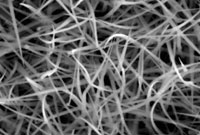Silicon nanowires give new and longer life to lithium batteries
Silicon nanowires can be used in lithium-ion batteries that power laptops, iPods, camcorders, cellular phones and many other electronic devices that people use in their everyday life.

A group of researchers from Stanford University found out that nanowires made of silicon allow to considerably enhance the output of Li-ion batteries. A laptop that can work on its common rechargeable battery for two hours will be able to run for 20 hours with the help of the new technology. That would be great news for those who regularly use laptops in their business trips.
Yi Cui, assistant professor of materials science and engineering, described the discovery as a “revolutionary development.”
Enhanced Li-ion batteries could then be used in the production of electric cars. In addition, they could expand the output of electric power generated by rooftop solar panels.
"Given the mature infrastructure behind silicon, this new technology can be pushed to real life quickly," Cui said.
The electrical storage capacity of a Li-ion battery depends on how much lithium can be held in the battery's anode, which is typically made of carbon. Silicon has a much higher capacity than carbon, but also has a downside.
Silicon placed in a battery swells as it absorbs positively charged lithium atoms during charging, then shrinks during use (i.e., when playing your iPod) as the lithium is drawn out of the silicon. This expand/shrink cycle typically causes the silicon (often in the form of particles or a thin film) to pulverize, degrading the performance of the battery.
The new battery pushes this problem aside with the help of nanotechnology. The battery stores lithium in silicon nanowires, each with the diameter one-thousandth the thickness of a sheet of paper. The wires inflate four times as they absorb lithium, but they do not fracture like other silicon-made shapes.
Scientists launched the research about 30 years ago, but gave up the efforts because the capacity was not high enough.
Subscribe to Pravda.Ru Telegram channel, Facebook, RSS!


